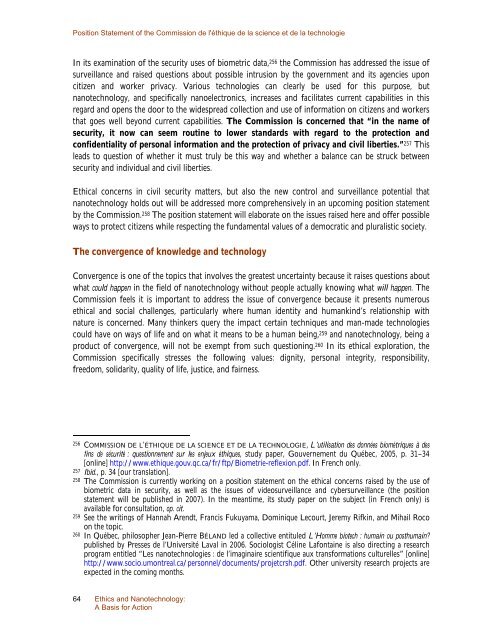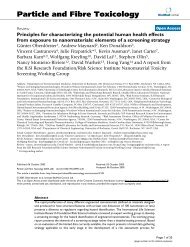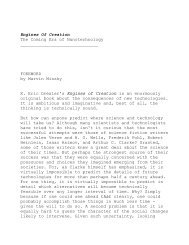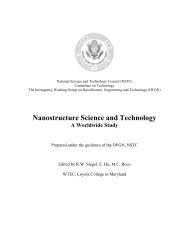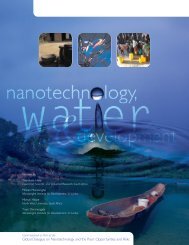A Basis for Action - Commission de l'éthique de la science et de la ...
A Basis for Action - Commission de l'éthique de la science et de la ...
A Basis for Action - Commission de l'éthique de la science et de la ...
Create successful ePaper yourself
Turn your PDF publications into a flip-book with our unique Google optimized e-Paper software.
Position Statement of the <strong>Commission</strong> <strong>de</strong> l'éthique <strong>de</strong> <strong>la</strong> <strong>science</strong> <strong>et</strong> <strong>de</strong> <strong>la</strong> technologie<br />
In its examination of the security uses of biom<strong>et</strong>ric data, 256 the <strong>Commission</strong> has addressed the issue of<br />
surveil<strong>la</strong>nce and raised questions about possible intrusion by the government and its agencies upon<br />
citizen and worker privacy. Various technologies can clearly be used <strong>for</strong> this purpose, but<br />
nanotechnology, and specifically nanoelectronics, increases and facilitates current capabilities in this<br />
regard and opens the door to the wi<strong>de</strong>spread collection and use of in<strong>for</strong>mation on citizens and workers<br />
that goes well beyond current capabilities. The <strong>Commission</strong> is concerned that “in the name of<br />
security, it now can seem routine to lower standards with regard to the protection and<br />
confi<strong>de</strong>ntiality of personal in<strong>for</strong>mation and the protection of privacy and civil liberties.” 257 This<br />
leads to question of wh<strong>et</strong>her it must truly be this way and wh<strong>et</strong>her a ba<strong>la</strong>nce can be struck b<strong>et</strong>ween<br />
security and individual and civil liberties.<br />
Ethical concerns in civil security matters, but also the new control and surveil<strong>la</strong>nce potential that<br />
nanotechnology holds out will be addressed more comprehensively in an upcoming position statement<br />
by the <strong>Commission</strong>. 258 The position statement will e<strong>la</strong>borate on the issues raised here and offer possible<br />
ways to protect citizens while respecting the fundamental values of a <strong>de</strong>mocratic and pluralistic soci<strong>et</strong>y.<br />
The convergence of knowledge and technology<br />
Convergence is one of the topics that involves the greatest uncertainty because it raises questions about<br />
what could happen in the field of nanotechnology without people actually knowing what will happen. The<br />
<strong>Commission</strong> feels it is important to address the issue of convergence because it presents numerous<br />
<strong>et</strong>hical and social challenges, particu<strong>la</strong>rly where human i<strong>de</strong>ntity and humankind’s re<strong>la</strong>tionship with<br />
nature is concerned. Many thinkers query the impact certain techniques and man-ma<strong>de</strong> technologies<br />
could have on ways of life and on what it means to be a human being, 259 and nanotechnology, being a<br />
product of convergence, will not be exempt from such questioning. 260 In its <strong>et</strong>hical exploration, the<br />
<strong>Commission</strong> specifically stresses the following values: dignity, personal integrity, responsibility,<br />
freedom, solidarity, quality of life, justice, and fairness.<br />
256 COMMISSION DE L’ÉTHIQUE DE LA SCIENCE ET DE LA TECHNOLOGIE, L’utilisation <strong>de</strong>s données biométriques à <strong>de</strong>s<br />
fins <strong>de</strong> sécurité : questionnement sur les enjeux éthiques, study paper, Gouvernement du Québec, 2005, p. 31–34<br />
[online] http://www.<strong>et</strong>hique.gouv.qc.ca/fr/ftp/Biom<strong>et</strong>rie-reflexion.pdf. In French only.<br />
257 Ibid., p. 34 [our trans<strong>la</strong>tion].<br />
258 The <strong>Commission</strong> is currently working on a position statement on the <strong>et</strong>hical concerns raised by the use of<br />
biom<strong>et</strong>ric data in security, as well as the issues of vi<strong>de</strong>osurveil<strong>la</strong>nce and cybersurveil<strong>la</strong>nce (the position<br />
statement will be published in 2007). In the meantime, its study paper on the subject (in French only) is<br />
avai<strong>la</strong>ble <strong>for</strong> consultation, op. cit.<br />
259 See the writings of Hannah Arendt, Francis Fukuyama, Dominique Lecourt, Jeremy Rifkin, and Mihail Roco<br />
on the topic.<br />
260 In Québec, philosopher Jean-Pierre BÉLAND led a collective entituled L’Homme biotech : humain ou posthumain?<br />
published by Presses <strong>de</strong> l’Université Laval in 2006. Sociologist Céline Lafontaine is also directing a research<br />
program entitled “Les nanotechnologies : <strong>de</strong> l’imaginaire scientifique aux trans<strong>for</strong>mations culturelles” [online]<br />
http://www.socio.umontreal.ca/personnel/documents/proj<strong>et</strong>crsh.pdf. Other university research projects are<br />
expected in the coming months.<br />
64 Ethics and Nanotechnology:<br />
A <strong>Basis</strong> <strong>for</strong> <strong>Action</strong>


